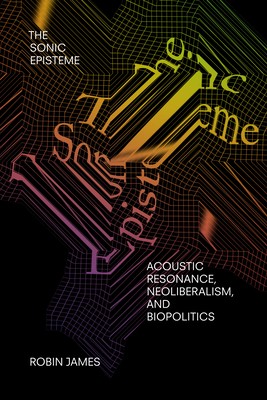
- We will send in 10–14 business days.
- Author: Robin James
- Publisher: Duke University Press
- ISBN-10: 1478006641
- ISBN-13: 9781478006640
- Format: 15.2 x 22.9 x 1.8 cm, minkšti viršeliai
- Language: English
- SAVE -10% with code: EXTRA
Reviews
Description
In The Sonic Episteme Robin James examines how twenty-first-century conceptions of sound as acoustic resonance shape notions of the social world, personhood, and materiality in ways that support white supremacist capitalist patriarchy. Drawing on fields ranging from philosophy and sound studies to black feminist studies and musicology, James shows how what she calls the sonic episteme--a set of sound-based rules that qualitatively structure social practices in much the same way that neoliberalism uses statistics--employs a politics of exception to maintain hegemonic neoliberal and biopolitical projects. Where James sees the normcore averageness of Taylor Swift and Spandau Ballet as contributing to the sonic episteme's marginalization of nonnormative conceptions of gender, race, and personhood, the black feminist political ontologies she identifies in Beyoncé's and Rihanna's music challenge such marginalization. In using sound to theorize political ontology, subjectivity, and power, James argues for the further articulation of sonic practices that avoid contributing to the systemic relations of domination that biopolitical neoliberalism creates and polices.
EXTRA 10 % discount with code: EXTRA
The promotion ends in 23d.22:22:13
The discount code is valid when purchasing from 10 €. Discounts do not stack.
- Author: Robin James
- Publisher: Duke University Press
- ISBN-10: 1478006641
- ISBN-13: 9781478006640
- Format: 15.2 x 22.9 x 1.8 cm, minkšti viršeliai
- Language: English English
In The Sonic Episteme Robin James examines how twenty-first-century conceptions of sound as acoustic resonance shape notions of the social world, personhood, and materiality in ways that support white supremacist capitalist patriarchy. Drawing on fields ranging from philosophy and sound studies to black feminist studies and musicology, James shows how what she calls the sonic episteme--a set of sound-based rules that qualitatively structure social practices in much the same way that neoliberalism uses statistics--employs a politics of exception to maintain hegemonic neoliberal and biopolitical projects. Where James sees the normcore averageness of Taylor Swift and Spandau Ballet as contributing to the sonic episteme's marginalization of nonnormative conceptions of gender, race, and personhood, the black feminist political ontologies she identifies in Beyoncé's and Rihanna's music challenge such marginalization. In using sound to theorize political ontology, subjectivity, and power, James argues for the further articulation of sonic practices that avoid contributing to the systemic relations of domination that biopolitical neoliberalism creates and polices.


Reviews